Early Christian Writings - 1
Chris Knepp
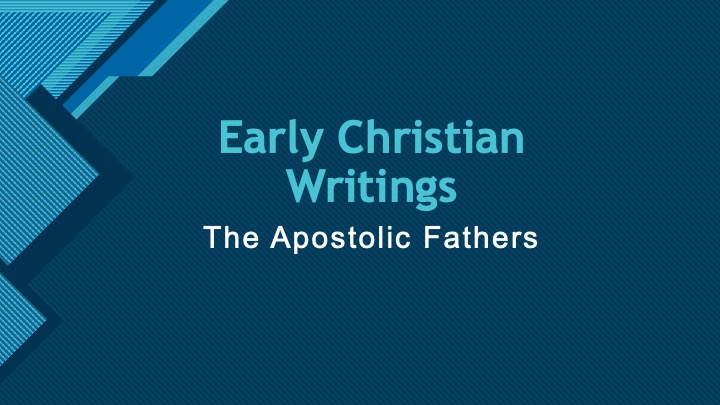
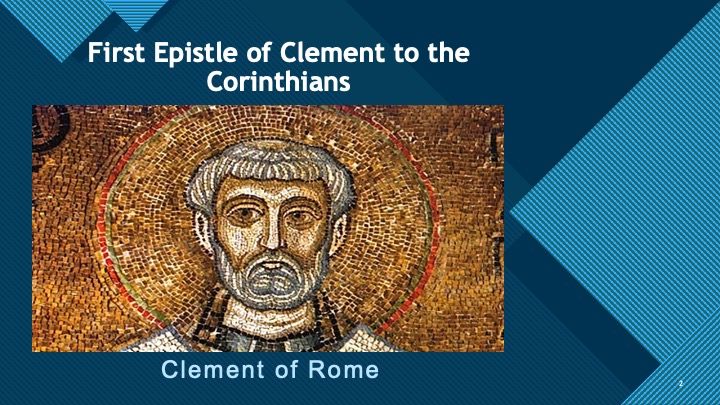
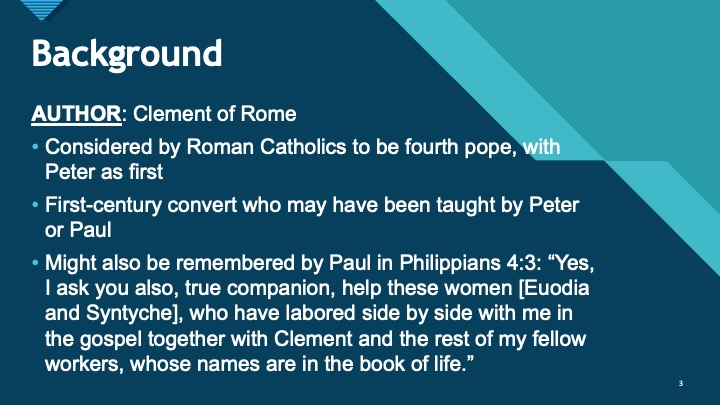
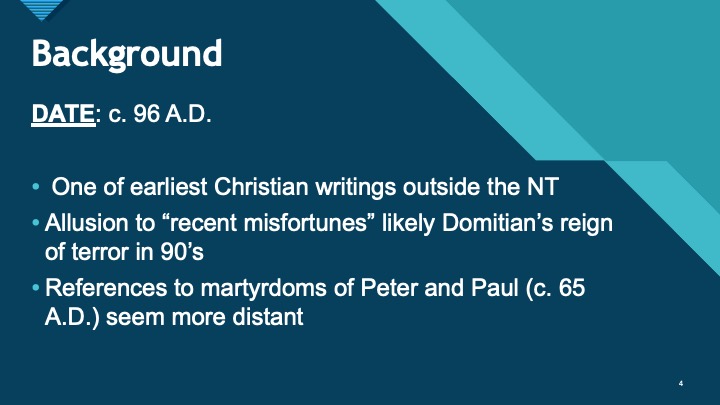
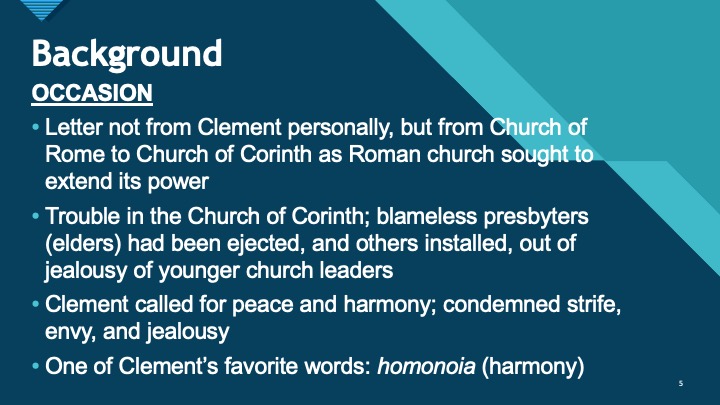
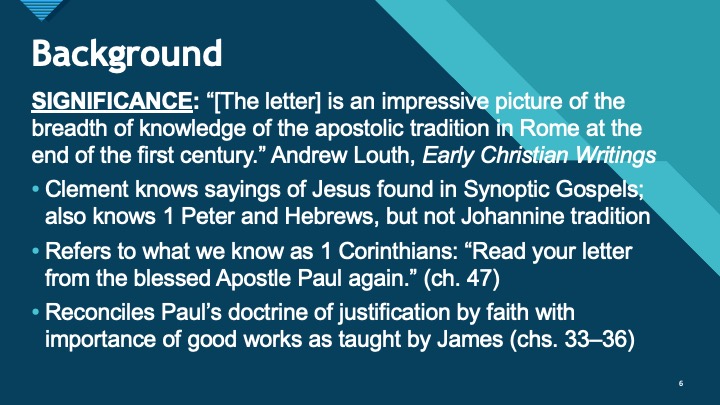
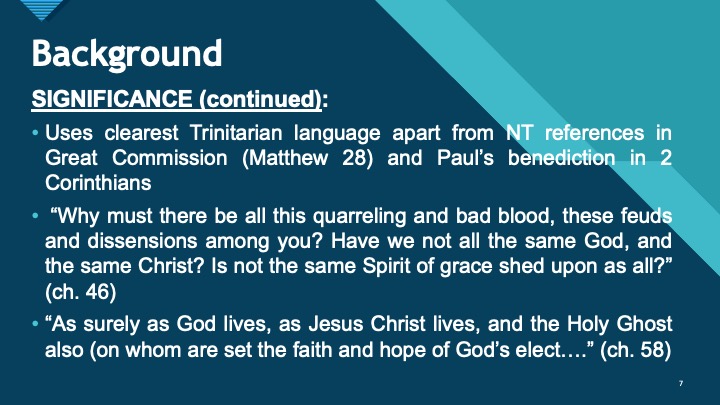
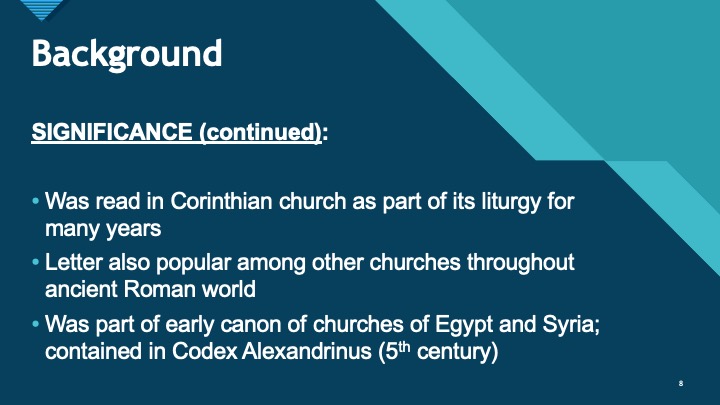
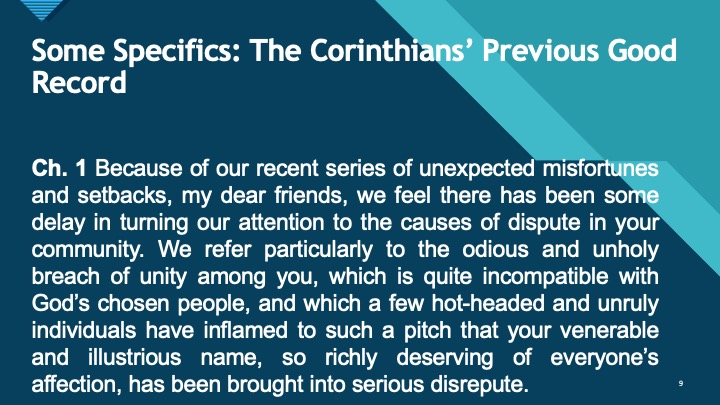
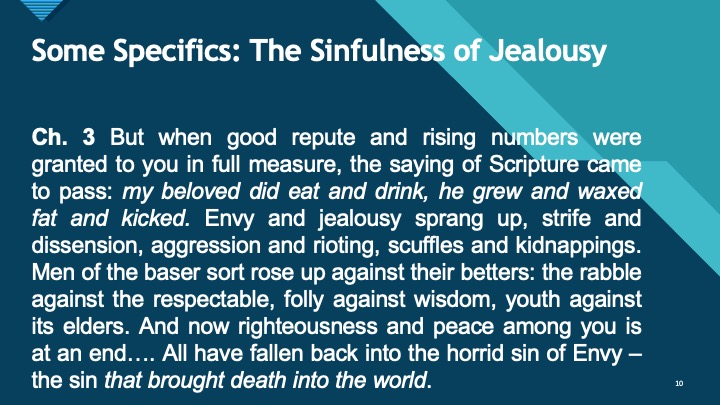
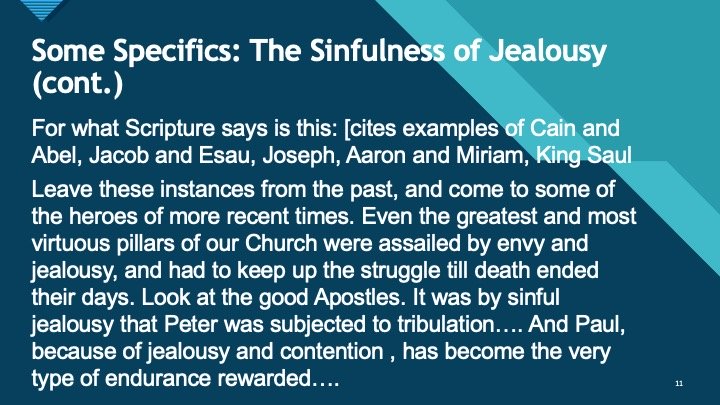
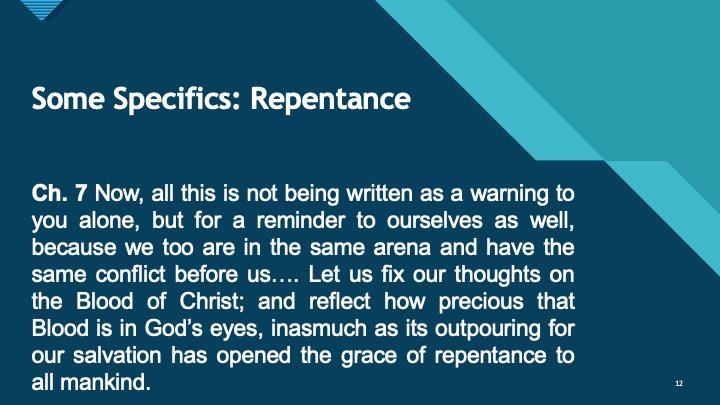
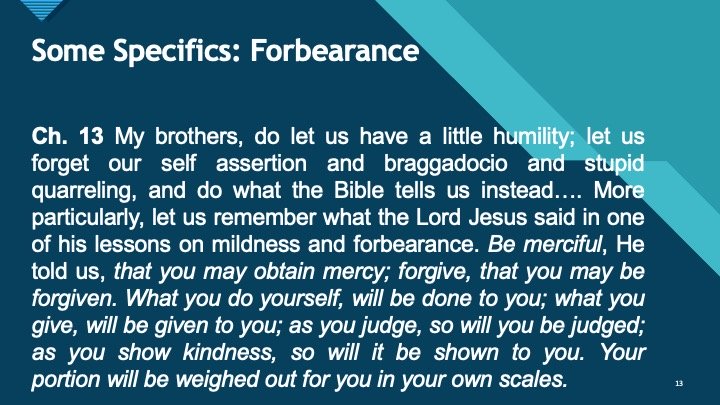
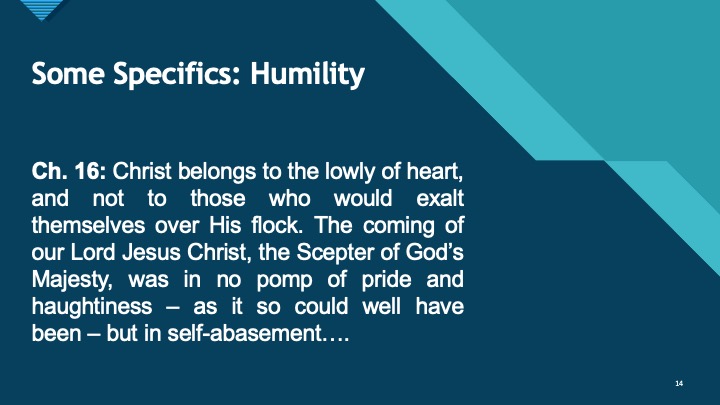
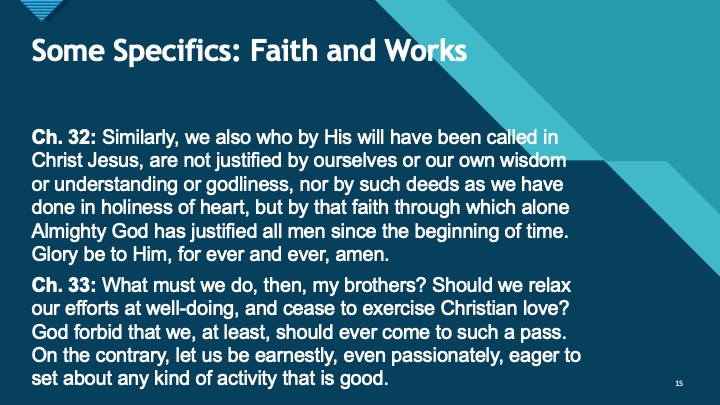
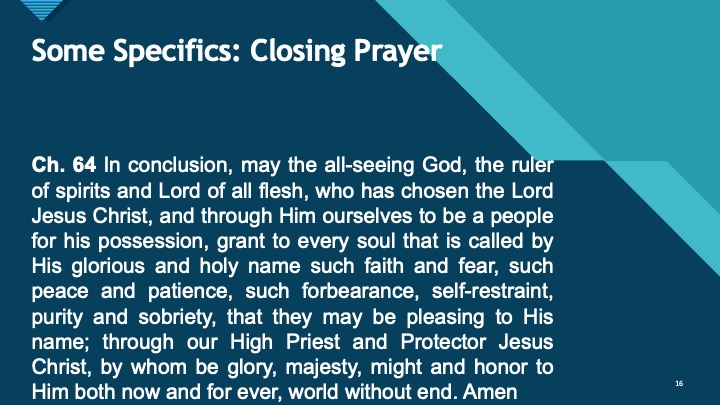
Early Christian Writings
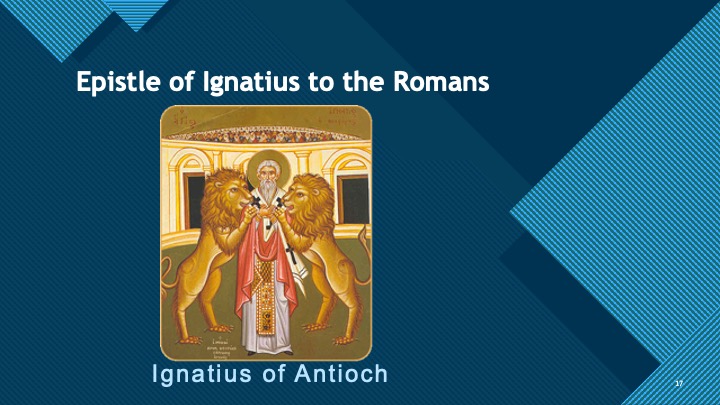
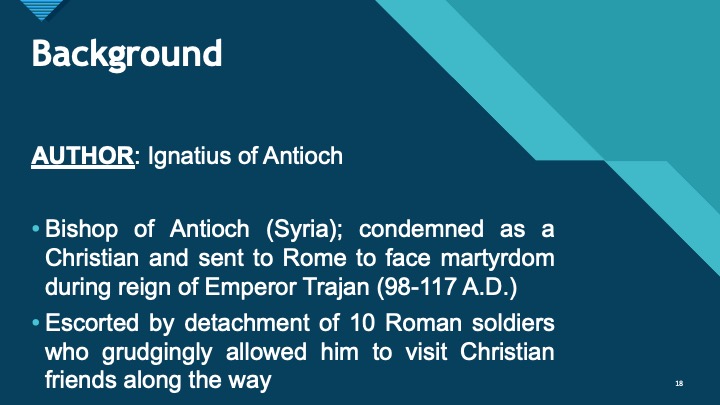
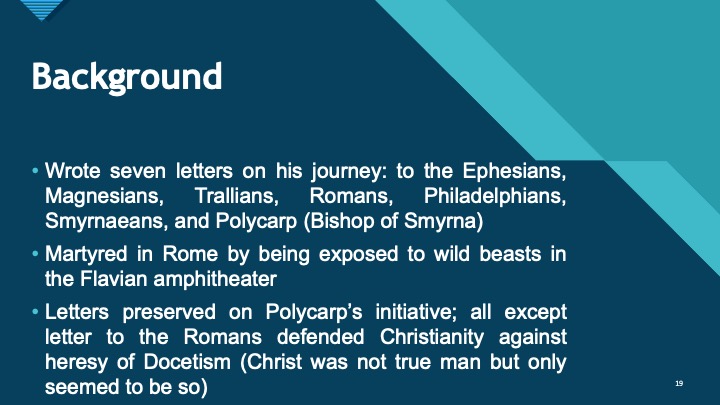
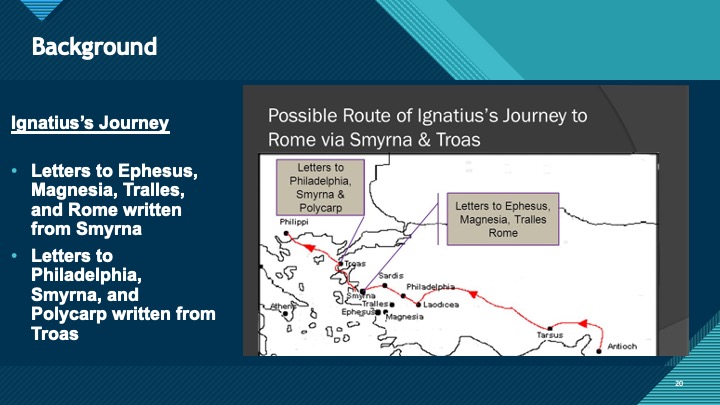
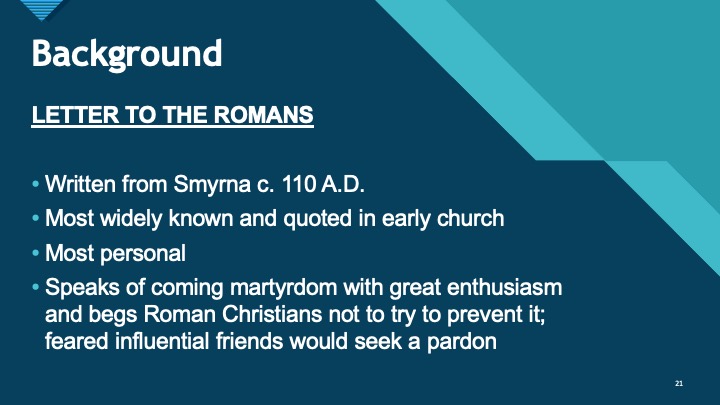
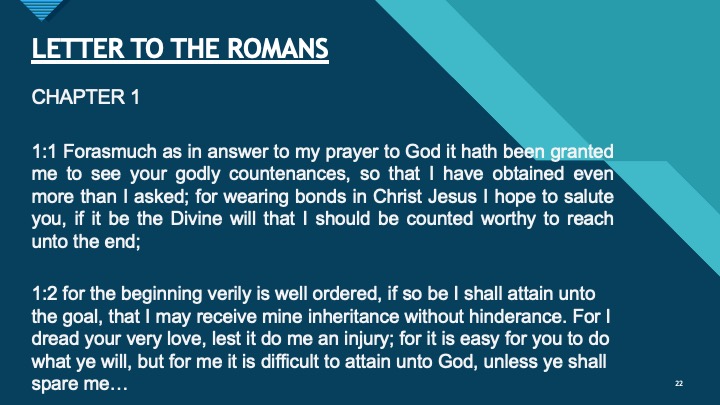
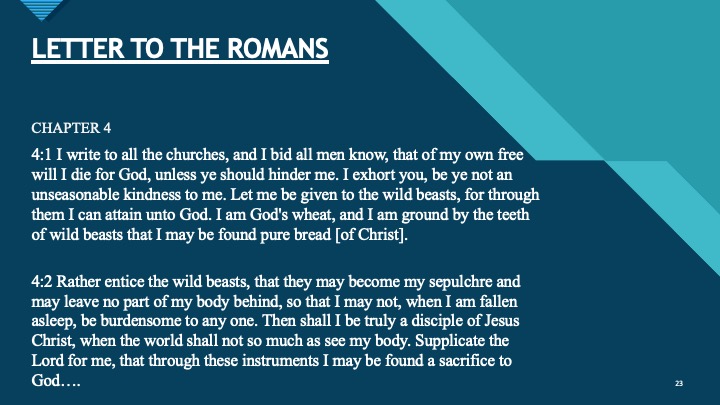
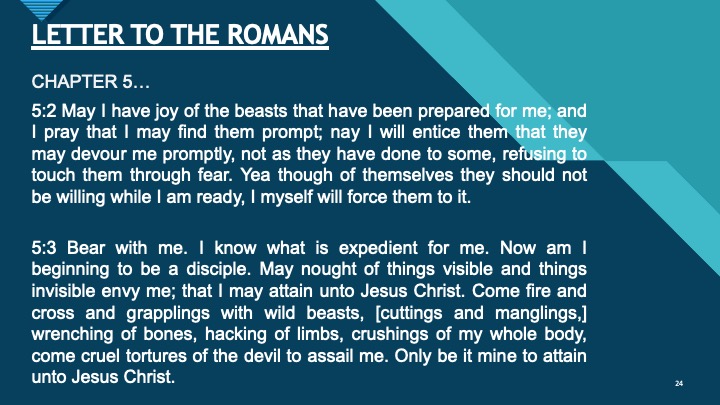
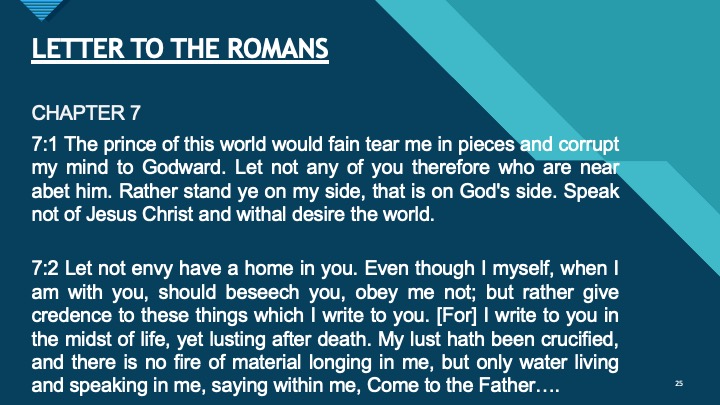
Early Christian Writings - 1
Links
< Home Page > < Early Christian Writings Menu > < Top of Page >
Early Christian Writings 1 Text
The Apostolic Fathers
First Epistle of Clement to the Corinthians
Clement of Rome
Background
AUTHOR: Clement of Rome
• Considered by Roman Catholics to be fourth pope, with Peter as first
• First-century convert who may have been taught by Peter or Paul
• Might also be remembered by Paul in Philippians 4:3: “Yes, I ask you also, true companion, help these women [Euodia and Syntyche], who have labored side by side with me in the gospel together with Clement and the rest of my fellow workers, whose names are in the book of life.”
DATE: c. 96 A.D.
• One of earliest Christian writings outside the NT
• Allusion to “recent misfortunes” likely Domitian’s reign of terror in 90’s
• References to martyrdoms of Peter and Paul (c. 65 A.D.) seem more distant
OCCASION
• Letter not from Clement personally, but from Church of Rome to Church of Corinth as Roman church sought to extend its power
• Trouble in the Church of Corinth; blameless presbyters (elders) had been ejected, and others installed, out of jealousy of younger church leaders
• Clement called for peace and harmony; condemned strife, envy, and jealousy
• One of Clement’s favorite words: homonoia (harmony)
SIGNIFICANCE: “[The letter] is an impressive picture of the breadth of knowledge of the apostolic tradition in Rome at the end of the first century.” Andrew Louth, Early Christian Writings
• Clement knows sayings of Jesus found in Synoptic Gospels; also knows 1 Peter and Hebrews, but not Johannine tradition
• Refers to what we know as 1 Corinthians: “Read your letter from the blessed Apostle Paul again.” (ch. 47)
• Reconciles Paul’s doctrine of justification by faith with importance of good works as taught by James (chs. 33–36)
SIGNIFICANCE (continued):
• Uses clearest Trinitarian language apart from NT references in Great Commission (Matthew 28) and Paul’s benediction in 2 Corinthians
• “Why must there be all this quarreling and bad blood, these feuds and dissensions among you? Have we not all the same God, and the same Christ? Is not the same Spirit of grace shed upon as all?” (ch. 46)
• “As surely as God lives, as Jesus Christ lives, and the Holy Ghost also (on whom are set the faith and hope of God’s elect….” (ch. 58)
SIGNIFICANCE (continued):
• Was read in Corinthian church as part of its liturgy for many years
• Letter also popular among other churches throughout ancient Roman world
• Was part of early canon of churches of Egypt and Syria; contained in Codex Alexandrinus (5th century)
Your second block of text
Some Specifics: The Corinthians’ Previous Good Record
Ch. 1 Because of our recent series of unexpected misfortunes and setbacks, my dear friends, we feel there has been some delay in turning our attention to the causes of dispute in your community. We refer particularly to the odious and unholy breach of unity among you, which is quite incompatible with God’s chosen people, and which a few hot-headed and unruly individuals have inflamed to such a pitch that your venerable and illustrious name, so richly deserving of everyone’s affection, has been brought into serious disrepute
Some Specifics: The Sinfulness of Jealousy
Ch. 3 But when good repute and rising numbers were granted to you in full measure, the saying of Scripture came to pass: my beloved did eat and drink, he grew and waxed fat and kicked. Envy and jealousy sprang up, strife and dissension, aggression and rioting, scuffles and kidnappings. Men of the baser sort rose up against their betters: the rabble against the respectable, folly against wisdom, youth against its elders. And now righteousness and peace among you is at an end…. All have fallen back into the horrid sin of Envy – the sin that brought death into the world.
Some Specifics: The Sinfulness of Jealousy (cont.)
For what Scripture says is this: [cites examples of Cain and Abel, Jacob and Esau, Joseph, Aaron and Miriam, King Saul
Leave these instances from the past, and come to some of the heroes of more recent times. Even the greatest and most virtuous pillars of our Church were assailed by envy and jealousy, and had to keep up the struggle till death ended their days. Look at the good Apostles. It was by sinful jealousy that Peter was subjected to tribulation…. And Paul, because of jealousy and contention , has become the very type of endurance rewarded….
Some Specifics: Repentance
Ch. 7 Now, all this is not being written as a warning to you alone, but for a reminder to ourselves as well, because we too are in the same arena and have the same conflict before us…. Let us fix our thoughts on the Blood of Christ; and reflect how precious that Blood is in God’s eyes, inasmuch as its outpouring for our salvation has opened the grace of repentance to all mankind.
Some Specifics: Forbearance
Ch. 13 My brothers, do let us have a little humility; let us forget our self assertion and braggadocio and stupid quarreling, and do what the Bible tells us instead…. More particularly, let us remember what the Lord Jesus said in one of his lessons on mildness and forbearance. Be merciful, He told us, that you may obtain mercy; forgive, that you may be forgiven. What you do yourself, will be done to you; what you give, will be given to you; as you judge, so will you be judged; as you show kindness, so will it be shown to you. Your portion will be weighed out for you in your own scales.
Some Specifics: Humility
Ch. 16: Christ belongs to the lowly of heart, and not to those who would exalt themselves over His flock. The coming of our Lord Jesus Christ, the Scepter of God’s Majesty, was in no pomp of pride and haughtiness – as it so could well have been – but in self-abasement….
Some Specifics: Faith and Works
Ch. 32: Similarly, we also who by His will have been called in Christ Jesus, are not justified by ourselves or our own wisdom or understanding or godliness, nor by such deeds as we have done in holiness of heart, but by that faith through which alone Almighty God has justified all men since the beginning of time. Glory be to Him, for ever and ever, amen.
Ch. 33: What must we do, then, my brothers? Should we relax our efforts at well-doing, and cease to exercise Christian love? God forbid that we, at least, should ever come to such a pass. On the contrary, let us be earnestly, even passionately, eager to set about any kind of activity that is good.
Some Specifics: Closing Prayer
Ch. 64 In conclusion, may the all-seeing God, the ruler of spirits and Lord of all flesh, who has chosen the Lord Jesus Christ, and through Him ourselves to be a people for his possession, grant to every soul that is called by His glorious and holy name such faith and fear, such peace and patience, such forbearance, self-restraint, purity and sobriety, that they may be pleasing to His name; through our High Priest and Protector Jesus Christ, by whom be glory, majesty, might and honor to Him both now and for ever, world without end. Amen
Early Christian Writings
Epistle of Ignatius to the Romans
Ignatius of Antioch
Background
AUTHOR: Ignatius of Antioch
• Bishop of Antioch (Syria); condemned as a Christian and sent to Rome to face martyrdom during reign of Emperor Trajan (98-117 A.D.)
• Escorted by detachment of 10 Roman soldiers who grudgingly allowed him to visit Christian friends along the way
• Wrote seven letters on his journey: to the Ephesians, Magnesians, Trallians, Romans, Philadelphians, Smyrnaeans, and Polycarp (Bishop of Smyrna)
• Martyred in Rome by being exposed to wild beasts in the Flavian amphitheater
• Letters preserved on Polycarp’s initiative; all except letter to the Romans defended Christianity against heresy of Docetism (Christ was not true man but only seemed to be so)
Ignatius’s Journey
• Letters to Ephesus, Magnesia, Tralles, and Rome written from Smyrna
• Letters to Philadelphia, Smyrna, and Polycarp written from Troas
Background
LETTER TO THE ROMANS
• Written from Smyrna c. 110 A.D.
• Most widely known and quoted in early church
• Most personal
• Speaks of coming martyrdom with great enthusiasm and begs Roman Christians not to try to prevent it; feared influential friends would seek a pardon
LETTER TO THE ROMANS
CHAPTER 1
1:1 Forasmuch as in answer to my prayer to God it hath been granted me to see
your godly countenances, so that I have obtained even more than I asked; for
wearing bonds in Christ Jesus I hope to salute you, if it be the Divine will
that I should be counted worthy to reach unto the end;
1:2 for the beginning verily is well ordered, if so be I shall attain unto the
goal, that I may receive mine inheritance without hinderance. For I dread your
very love, lest it do me an injury; for it is easy for you to do what ye will,
but for me it is difficult to attain unto God, unless ye shall spare me…
CHAPTER 4
4:1 I write to all the churches, and I bid all men know, that of my own free will I die for God, unless ye should hinder me. I exhort you, be ye not an unseasonable kindness to me. Let me be given to the wild beasts, for through them I can attain unto God. I am God's wheat, and I am ground by the teeth of wild beasts that I may be found pure bread [of Christ].
4:2 Rather entice the wild beasts, that they may become my sepulchre and may
leave no part of my body behind, so that I may not, when I am fallen asleep, be
burdensome to any one. Then shall I be truly a disciple of Jesus Christ, when
the world shall not so much as see my body. Supplicate the Lord for me, that
through these instruments I may be found a sacrifice to God….
CHAPTER 5…
5:2 May I have joy of the beasts that have been prepared for me; and I pray that I may find them prompt; nay I will entice them that they may devour me promptly, not as they have done to some, refusing to touch them through fear. Yea though of themselves they should not be willing while I am ready, I myself will force them to it.
5:3 Bear with me. I know what is expedient for me. Now am I beginning to be a
disciple. May nought of things visible and things invisible envy me; that I may
attain unto Jesus Christ. Come fire and cross and grapplings with wild beasts,
[cuttings and manglings,] wrenching of bones, hacking of limbs, crushings of my
whole body, come cruel tortures of the devil to assail me. Only be it mine to
attain unto Jesus Christ.
CHAPTER 7
7:1 The prince of this world would fain tear me in pieces and corrupt my mind to Godward. Let not any of you therefore who are near abet him. Rather stand ye on my side, that is on God's side. Speak not of Jesus Christ and withal desire the world.
7:2 Let not envy have a home in you. Even though I myself, when I am with you,
should beseech you, obey me not; but rather give credence to these things which
I write to you. [For] I write to you in the midst of life, yet lusting after
death. My lust hath been crucified, and there is no fire of material longing in
me, but only water living and speaking in me, saying within me, Come to the
Father….